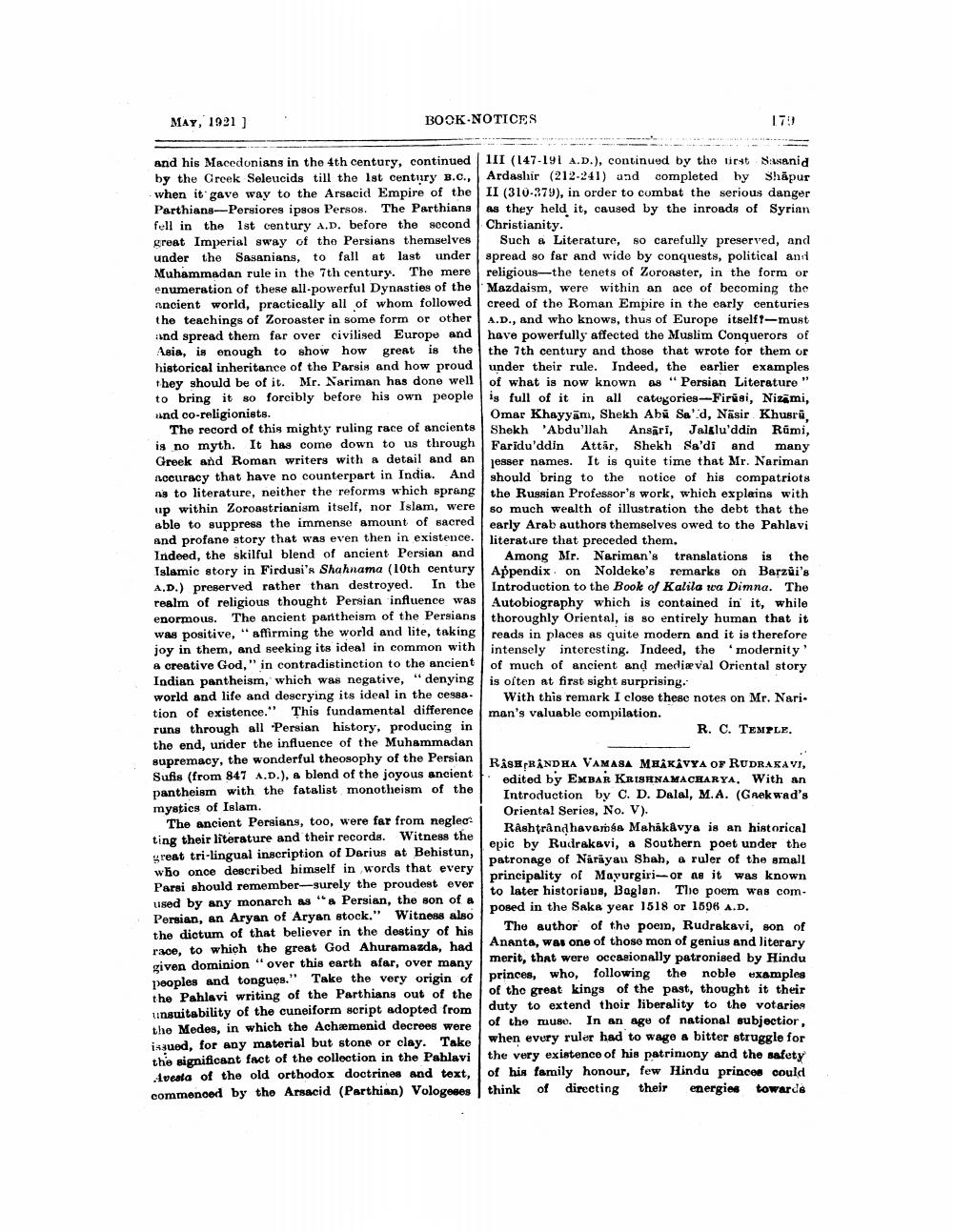________________
MAY, 1921)
BOOK NOTICES
and his Macedonians in the 4th century, continued 111 (147-191 A.D.), continued by the tirst Nisanid by the Creek Seleucids till the lst century B.C., Ardashir (212-241) and completed by Shapur when it gave way to the Arsacid Empire of the II (310-379), in order to combat the serious danger Parthians--Persiores ipsos Persos. The Parthians as they held it, caused by the inroads of Syrian fell in the 1st century A.D. before the second Christianity. great Imperial sway of the Persians themselves Such & Literature, so carefully preserved, and under the Sasanians, to fall at last under spread so far and wide by conquests, political and Muhammadan rule in the 7th century. The mere religious—the tenets of Zoroaster, in the form or enumeration of these all-powerful Dynasties of the Mazdaism, were within an ace of becoming the ancient world, practically all of whom followed creed of the Roman Empire in the early centuries the teachings of Zoroaster in some form or other A.D., and who knows, thus of Europe itself i-must Ind spread them far over civilised Europe and have powerfully affected the Muslim Conquerors of Asia, is enough to show how great is the the 7th century and those that wrote for them or historical inheritance of the Parsis and how proud under their rule. Indeed, the earlier examples they should be of it. Mr. Nariman has done well of what is now known as “Pareian Li to bring it 80 forcibly before his own people is full of it in all categories --Firūsi, Nizami, and co-religionists.
Omar Khayyam, Shekh Aba Sa'd, Nasir Khusrū The record of this mighty ruling race of ancients
Shekh 'Abdu'llah Ansarī, Jalglu'ddin Rūmi, is no myth. It has come down to us through Faridu'ddin Attár, Shekh Sa'di and many Greek and Roman writers with a detail and an
jesser names. It is quite time that Mr. Nariman nccuracy that have no counterpart in India. And
should bring to the notice of his compatriots ng to literature, neither the reforms which sprang the Russian Professor's work, which explains with up within Zoroastrianism itself, nor Islam, were so much wealth of illne
so much wealth of illustration the debt that the able to suppress the immense amount of sacred early Arab authors themselves owed to the Pahlavi and profane story that was even then in existence. literature that preceded them. Indeed, the skilful blend of ancient Persian and
Among Mr. Nariman's translations is the Islamic story in Firdusi's Shahnama (10th century
Appendixon Noldeke's remarks on Barzui's A.D.) preserved rather than destroyed. In the Introduction to the Book of Kalila roa Dimna. The realm of religious thought Persian influence was | Autobiography which is contained in it, while enormous. The ancient pantheism of the Persians thoroughly Oriental, is so entirely human that it was positive, "affirming the world and lite, taking reads in places as quite modern and it is therefore joy in them, and seeking its ideal in common with intensely interesting. Indeed, the modernity' a creative God," in contradistinction to the ancient of much of ancient and mediæval Oriental story Indian pantheism, which was negative, "denying is often at first sight surprising. world and life and descrying its ideal in the ce988. With this remark I close these notes on Mr. Nari. tion of existence." This fundamental difference runs through all Persian history, producing in
R. C. TEMPLE. the end, under the influence of the Muhammadan supremacy, the wonderful theosophy of the Persian
R&SH RANDHA VAMASA MHAKAVYA OF RUDRAKAVI, Sufis (from 847 A.D.), a blend of the joyous ancient
edited by EMBAR KRISHNAMACHARYA, With an pantheism with the fatalist monotheism of the
Introduction by C. D. Dalal, M.A. (Gaekwad's mystics of Islam.
Oriental Series, No. V). The ancient Persians, too, were far from neglec:
RAshtrândhavaosa Mahakavya is an historical ting their literature and their records. Witness the
epic by Rudrakavi, a Southern poet under the great tri-lingual inscription of Darius at Behistun,
patronage of Nārāyan Shah, a ruler of the small who once described himself in words that every
principality of Mayurgiri-or as it was known Parsi should remember-surely the proudest ever
to later historiaus, Baglan. The poem was comused by any monarch as "a Persian, the son of a
posed in the Sake year 1518 or 1596 A.D. Persian, an Aryan of Aryan stock." Witness also the dictum of that believer in the destiny of his
The author of the poem, Rudrakavi, son of race, to which the great God Ahuramazda, had
Ananta, was one of those mon of genius and literary given dominion "over this earth afar, over many
merit, that were occasionally patronised by Hindu peoples and tongues." Take the very origin of princes, who, following the noble examples the Pahlavi writing of the Parthians out of the of the great kings of the past, thought it their unsuitability of the cuneiform script adopted from duty to extend thoir liberality to the votaries the Medes, in which the Achaemenid decrees were
of the muse. In an age of national subjectior, issued, for any material but stone or clay. Take when every ruler had to wage a bitter struggle for
ant of the collection in the Pahlavi | the very existence of his patrimony and the safety the significant fact of the collection in the Pahlavi Avesta of the old orthodox doctrines and text, of his family honour, few Hindu princes could commenced by the Arsacid (Parthian) Vologeses think of directing their energies towarde




